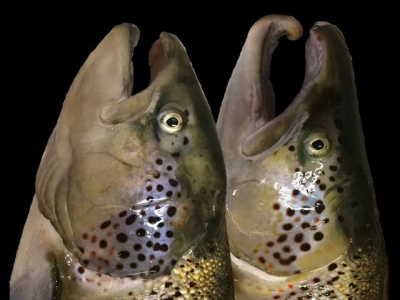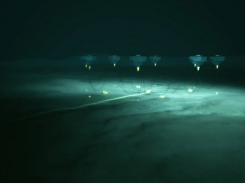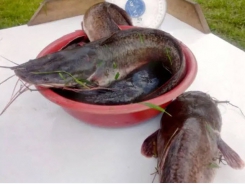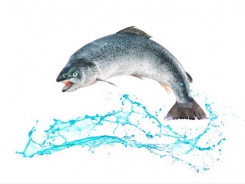Size matters for salmon

New research reveals that farmed male salmon are less attractive to females than their wild cousins, due to the fact that the farmed versions have smaller kypes.
An image showing how the size of salmon's jaw hooks, known as kypes, can vary. Photo © Bangor University
This new finding, published in the journal Royal Society Open Science, not only implies that farm-bred salmon are less sexually attractive but also that, within only 12 generations of being farmed, are already diverging from their wild forebears – a divergence that “could reduce the long-term health of wild populations”, according to William Perry, a PhD student at Bangor University and the paper’s lead author.
As Perry explains: “Initially, the fact that any escaped salmon are less ‘attractive’ because of their smaller kype may seem like good news, as they’re less likely to breed. That’s not the whole story however. Because farmed fish do not have to compete for mates, there is no element of sexual selection happening, making the farmed and hybrid fish poorly adapted to breeding in the wild. So, when you do see high levels of farmed escapees, and inevitable interbreeding within a wild salmon population, this could reduce the long-term health of that population."
“Farmed or hybrid salmon are not only less likely to breed successfully in the wild, they are also less likely to return from the ocean to freshwater rivers to spawn.”
“Identifying that this secondary sexual trait is less pronounced in farmed salmon is another sign that as a diverging species, farmed fish are less well adapted, and are less able to compete than wild salmon. A pattern that may be repeating in many other aquaculture species.”
Prof Gary Carvalho, Perry’s PhD supervisor at Bangor University’s School of Natural Sciences commented: “This is the first study to look at the effect of domestication and hybridisation on sexually selected traits in salmon. Our findings demonstrate that when animals are kept in unnatural conditions, such as in a fish farm, rapid evolutionary change can take place, that can affect future reproduction and survival, after just 12 generations. Such changes are of special concern when hundreds of thousands of farmed fish can escape into the wild, and potentially interbreed, with wild relatives.
The findings form part of a wider research project into the differences between wild, farmed and hybrid salmon and Perry’s PhD is funded by the NERC ENVISION doctoral training programme, which is preparing the next generation of environmental scientists. He is working closely with the Institute of Marine Research in Bergen.
Related news
Tools

Phối trộn thức ăn chăn nuôi

Pha dung dịch thủy canh

Định mức cho tôm ăn

Phối trộn phân bón NPK

Xác định tỷ lệ tôm sống

Chuyển đổi đơn vị phân bón

Xác định công suất sục khí

Chuyển đổi đơn vị tôm

Tính diện tích nhà kính

Tính thể tích ao




 Catfish farmers seek to break 'mongers' monopoly
Catfish farmers seek to break 'mongers' monopoly  Resolution in dispute between Scottish Salmon Company and…
Resolution in dispute between Scottish Salmon Company and…